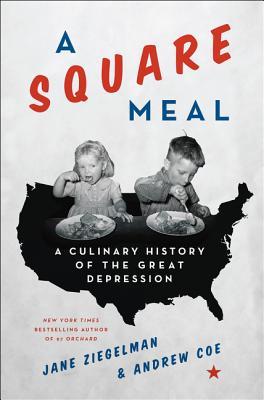
A Square Meal: a culinary history of the Great Depression by Jane Ziegelman & Andrew Coe
This book basically explores the history of the Great Depression through food - and often the lack thereof. It seemed like a lot of the focus was on how government agencies REALLY fought creating or giving any money toward feeding starving people around the country. Like the present, politicians are often far removed from the reality of the struggles of the people they are supposed to represent. But, in this book it did seem a little heavy-handed. Overall, it was not as interesting as I expected it to be. I really liked Ziegelman's previous book 97 Orchard, but this one didn't seem as interesting to me. It wasn't bad, but it wasn't great in my opinion.
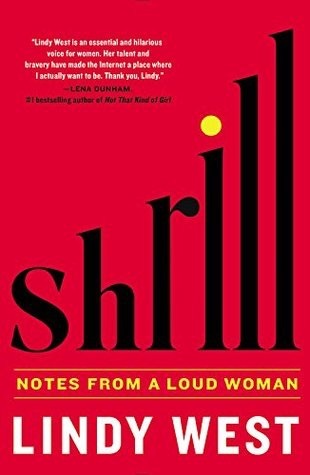
Shrill: notes from a loud woman by Lindy West
Lindy West is a fat female feminist - three things society tends to hate and when they are all together in one person - look out. If you're a woman and don't conform to societal "norms" like being thin and quiet Shrill is probably the least offensive name you'll be called. West writes about everything from her struggles with accepting her body, her love of all things comedy, how she took on rape jokes in comedy, and even how a troll pretending to be her dead father eventually came out and apologized to her. While her experiences are unique to her, she is also representative of all women who are called derogatory names for speaking out about the misogyny in our culture. At times laugh out loud funny and at times very serious, West is a voice we need to hear.
Some quotes I really liked:
"But it's just the Internet. There's nothing we can do. This is my reality now. Pretty much every day, at least one stranger seeks me out to call me a fat bitch (or some pithy variation thereof). Being harassed on the Internet is such a normal, common part of my life that I'm always surprised when other people find it surprising. You're telling me you don't have hundreds of men popping into your cubicle in the accounting department of your midsized, regional dry-goods distributor to inform you that - hmm - you're too fat to rape, but perhaps they'll saw you up with an electric knife? No? Just me, then. This is the barbarism - the eager abandonment of the social contract - that so many of us face simply for doing our jobs." (p. 123)
"In my lowest moment, when it seemed like the onslaught would never stop, an idea unfurled in my mind like some night-blooming flower: They'd handed me a gift, I realized. A suffocating deluge of violent misogyny was how American comedy fans reacted to a woman suggesting that comedy might have a misogyny problem. They'd attempted to demonstrate that comedy, in general, doesn't have issues with women by threatening to rape and kill me, telling me I'm just bitter because I'm too fat to get raped, and suggesting that the debate would have been better if it were just Jim raping me. Holy shit, I realized. I won. Their attempts to silence me made my point more effective than any think piece or flawless debate performance ever could...I compiled a sheaf of comments. (They were so uniformly vile I didn't need to dig for the 'worst' ones.) I sat in a big grey easy chair in my living room. Aham filmed me as I read aloud, in one relentless, deadpan beam, staring into the camera for nearly five minutes...Here is my face. Here are these words. 'It's just the Internet' doesn't seem so true anymore." (p. 203-4)
Some quotes I really liked:
"But it's just the Internet. There's nothing we can do. This is my reality now. Pretty much every day, at least one stranger seeks me out to call me a fat bitch (or some pithy variation thereof). Being harassed on the Internet is such a normal, common part of my life that I'm always surprised when other people find it surprising. You're telling me you don't have hundreds of men popping into your cubicle in the accounting department of your midsized, regional dry-goods distributor to inform you that - hmm - you're too fat to rape, but perhaps they'll saw you up with an electric knife? No? Just me, then. This is the barbarism - the eager abandonment of the social contract - that so many of us face simply for doing our jobs." (p. 123)
"In my lowest moment, when it seemed like the onslaught would never stop, an idea unfurled in my mind like some night-blooming flower: They'd handed me a gift, I realized. A suffocating deluge of violent misogyny was how American comedy fans reacted to a woman suggesting that comedy might have a misogyny problem. They'd attempted to demonstrate that comedy, in general, doesn't have issues with women by threatening to rape and kill me, telling me I'm just bitter because I'm too fat to get raped, and suggesting that the debate would have been better if it were just Jim raping me. Holy shit, I realized. I won. Their attempts to silence me made my point more effective than any think piece or flawless debate performance ever could...I compiled a sheaf of comments. (They were so uniformly vile I didn't need to dig for the 'worst' ones.) I sat in a big grey easy chair in my living room. Aham filmed me as I read aloud, in one relentless, deadpan beam, staring into the camera for nearly five minutes...Here is my face. Here are these words. 'It's just the Internet' doesn't seem so true anymore." (p. 203-4)

The Third Plate: field notes on the future of food by Dan Barber
Dan Barber is a chef and chefs often drive food trends. The farm-to-table movement tried to change the way we eat and grow food, but it's still catering to societal trends and isn't enough to really turn our food industry around. As Barber explains the "first plate" is industrial/factory farmed food, the "second plate" is organic/farm-to-table food, but The Third Plate could be a game-changer - it's focusing on a more integrated and truly sustainable food. Barber explores this issue through some ground-breaking farmers who are on the cusp of the third plate farming movement. People like Klaas and Mary-Howell Martens with their organic grain and milling enterprise, Eduardo Sousa and his natural (not force-fed) fois gras, Miguel Medialdea of Veta la Palma - a "natural" fish farm, Glenn Roberts of Anson Mills, and Steve Jones of the Bread Lab - these farmer/scientist types are on the cutting edge of the food world. While Barber does a great job of exploring these innovators and what they're doing, there is still the question of how to get these kind of people and farms all over the country and world.
In some of the reviews I read of this book there was the complaint that Barber is elitist and this type of food is not available to everyone due to the cost. As a whole we have gotten so far away from where our food comes from that the expectation now is dirt cheap food - and with food as with many other things you get what you pay for. With cheap food you will pay in the long run with your health. And cheap food has hidden costs - in destruction of the land/sea/soil, suffering of the animals and workers, full of chemicals and grown for shipability not flavor. If more small to mid size farms were practicing these integrative and sustainable techniques there would be more of this kind of food to go around. Right now because these people are doing what no one else is doing they can charge a premium for their products. But, almost anyone can grow their own food and really nourish the soil in order to get more quality and tasty food. Definitely a book that will make you think.
Some quotes I really liked:
"It helps if your worldview includes the belief that nature knows best. A plant suffering from an infestation of pests is not a shortcoming of nature; it's a plant you're not mothering well. Either the nutrient balance in the soil is wrong or your crops aren't being rotated properly or the variety cultivated is wrong for the area - or any one of dozens of other possibilities. Your job is to figure it out. Since the chemical farmer has the option of spraying the problem away, he tends not to bother." (p. 55)
"In the words of ecologist Frank Egler, 'Nature is not more complex than we think, but more complex than we can think.'" (p. 88)
"Of the diet-related diseases that have spiked in the past century, the obesity epidemic would seem to have been impossible to predict. And yet, in the 1930s, [Dr. William] Albrecht [a soil scientist] came close. He knew that cows grazing from well-mineralized soils ate balanced diets. But when kept in a barn and fed a predetermined grain ration, they never stopped eating, overindulging in a vain attempt to make up with sheer volume for what they weren't getting in their food. Albrecht believed our bodies would likewise stuff themselves for the same reason. Starved of micronutrients, he said, we will keep eating in the hope of attaining them...Albrecht...worked backward from his observation of healthy people. 'Rather than assuming what a healthy diet should be, he looked at healthy people and figured out what made them healthy,' Klaas told me. 'He could almost always trace it back to healthy soil.'"(p.97-8)
"In just the past thirty years, the poultry industry has tripled its production of chickens, from 11.3 billion pounds to 37 billion pounds. But we don't eat 37 billion pounds of chicken, and the excess chicken has to end up somewhere. Processed food - Chicken McNuggets, for example - heroically soaked up the imbalance for a time. So did pet food. More recently, excess chicken is fed to cattle (an eyebrow raiser, since cattle aren't carnivores) and now increasingly even to fish. Why? Because while the price of wild fish - the traditional feed for aquaculture - has risen dramatically in the past decade, the relative cost of chicken has gone down. It's cheaper to feed chicken...I once asked an aquaculture biologist what was sustainable about feeding chicken to fish. There was a long pause. 'Well, Chef,' he said, 'there's just too much chicken in this country.' Another solution has been to look abroad - to dump unwanted parts onto other countries." (p. 155-6)
"The overproduction of grain helps enable the overproduction of chicken, which lowers the price of chicken, which means even more chickens are raised to make up for the declining revenue. That leads to even more unneeded chicken. So it's fed to other animals it probably shouldn't be fed to, like fish (which are increasingly farm-raised, in part due to the offshore pollution caused by producing too much grain). And then the overproduced chicken gets dumped to places like Mexico. To compete, Mexico turns to the same kind of system, the get-big-or-get-out system that feeds on itself: produce more chicken at lower prices. Laid-off poultry workers seek work in America, often illegally, which drives down wages and helps poultry companies produce...more chicken." (p. 157)
"'And the business model for all of this?' I asked. 'I mean, for Anson Mills. It sounds like you've become a company that donates seeds and pays farmers to grow them out. Where's the profit in that?' 'There's no profit. We're up to three million in revenue, based on the sales to thirty-two hundred chefs. Chefs are driving this, literally. Every year we turn around and zero out the bank account. All the money goes to seed work at this point.' It was humbling to see how, in Glenn's hands, the power of chefs could be harnessed for such good." (p. 379)
In some of the reviews I read of this book there was the complaint that Barber is elitist and this type of food is not available to everyone due to the cost. As a whole we have gotten so far away from where our food comes from that the expectation now is dirt cheap food - and with food as with many other things you get what you pay for. With cheap food you will pay in the long run with your health. And cheap food has hidden costs - in destruction of the land/sea/soil, suffering of the animals and workers, full of chemicals and grown for shipability not flavor. If more small to mid size farms were practicing these integrative and sustainable techniques there would be more of this kind of food to go around. Right now because these people are doing what no one else is doing they can charge a premium for their products. But, almost anyone can grow their own food and really nourish the soil in order to get more quality and tasty food. Definitely a book that will make you think.
Some quotes I really liked:
"It helps if your worldview includes the belief that nature knows best. A plant suffering from an infestation of pests is not a shortcoming of nature; it's a plant you're not mothering well. Either the nutrient balance in the soil is wrong or your crops aren't being rotated properly or the variety cultivated is wrong for the area - or any one of dozens of other possibilities. Your job is to figure it out. Since the chemical farmer has the option of spraying the problem away, he tends not to bother." (p. 55)
"In the words of ecologist Frank Egler, 'Nature is not more complex than we think, but more complex than we can think.'" (p. 88)
"Of the diet-related diseases that have spiked in the past century, the obesity epidemic would seem to have been impossible to predict. And yet, in the 1930s, [Dr. William] Albrecht [a soil scientist] came close. He knew that cows grazing from well-mineralized soils ate balanced diets. But when kept in a barn and fed a predetermined grain ration, they never stopped eating, overindulging in a vain attempt to make up with sheer volume for what they weren't getting in their food. Albrecht believed our bodies would likewise stuff themselves for the same reason. Starved of micronutrients, he said, we will keep eating in the hope of attaining them...Albrecht...worked backward from his observation of healthy people. 'Rather than assuming what a healthy diet should be, he looked at healthy people and figured out what made them healthy,' Klaas told me. 'He could almost always trace it back to healthy soil.'"(p.97-8)
"In just the past thirty years, the poultry industry has tripled its production of chickens, from 11.3 billion pounds to 37 billion pounds. But we don't eat 37 billion pounds of chicken, and the excess chicken has to end up somewhere. Processed food - Chicken McNuggets, for example - heroically soaked up the imbalance for a time. So did pet food. More recently, excess chicken is fed to cattle (an eyebrow raiser, since cattle aren't carnivores) and now increasingly even to fish. Why? Because while the price of wild fish - the traditional feed for aquaculture - has risen dramatically in the past decade, the relative cost of chicken has gone down. It's cheaper to feed chicken...I once asked an aquaculture biologist what was sustainable about feeding chicken to fish. There was a long pause. 'Well, Chef,' he said, 'there's just too much chicken in this country.' Another solution has been to look abroad - to dump unwanted parts onto other countries." (p. 155-6)
"The overproduction of grain helps enable the overproduction of chicken, which lowers the price of chicken, which means even more chickens are raised to make up for the declining revenue. That leads to even more unneeded chicken. So it's fed to other animals it probably shouldn't be fed to, like fish (which are increasingly farm-raised, in part due to the offshore pollution caused by producing too much grain). And then the overproduced chicken gets dumped to places like Mexico. To compete, Mexico turns to the same kind of system, the get-big-or-get-out system that feeds on itself: produce more chicken at lower prices. Laid-off poultry workers seek work in America, often illegally, which drives down wages and helps poultry companies produce...more chicken." (p. 157)
"'And the business model for all of this?' I asked. 'I mean, for Anson Mills. It sounds like you've become a company that donates seeds and pays farmers to grow them out. Where's the profit in that?' 'There's no profit. We're up to three million in revenue, based on the sales to thirty-two hundred chefs. Chefs are driving this, literally. Every year we turn around and zero out the bank account. All the money goes to seed work at this point.' It was humbling to see how, in Glenn's hands, the power of chefs could be harnessed for such good." (p. 379)
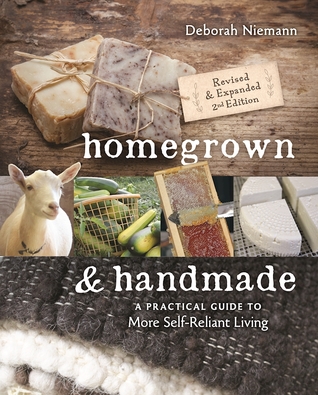
Homegrown & Handmade by Deborah Niemann
When Deborah Niemann and her husband have been homesteading for 15 years now and over time they have expanded and added to their homestead. I hadn't seen the original edition, but this one is the updated 2nd edition. I really liked her introduction about why they changed their lifestyle to one of homesteading and the benefits from that change. I also know that any book Joel Salatin writes the forward to will be worth reading! I really liked how she organized the book by topic - gardening, orchard, poultry, homegrown business, etc. that way you could read the sections that interested you the most. But some of the other sections were helpful - I'm not planning to raise pigs, but the chapter on cooking with pork and lard was still something I wanted to read. Overall, it is a good introduction to the various aspects of homesteading. It's not meant to be a comprehensive guide - the chapter on honey is only a few pages long and that is not enough to make you a beekeeper, but it can explain the basics so you can then delve further into that aspect if it interests you with other books, classes, etc. Overall, a very helpful book if you want to do more for yourself.
A quote I really liked:
"It first became obvious to researchers in the 1970s that farmers had a much higher rate of some cancers, although they are otherwise healthier than the general population. Since then, studies from many countries have found that farmers have increased rates of leukemia, non-Hodgkin's lymphoma, multiple myeloma, soft tissue sarcoma, and cancers of the skin, lip, prostate, brain, and stomach. After eliminating possible causes - such as increased sun exposure causing an increased risk of skin cancer - insecticides were declared the culprit for the increased risks of leukemia, multiple myeloma, and brain cancer. Herbicides have been linked to non-Hodgkin's lymphoma and soft tissue sarcoma...A 2004 study showed that children of farmers who apply pesticides have higher rates of several cancers. That study included 17,357 children born to Iowan farmers after 1975 and compared them to the cancer rates for the general population of Iowa during the same time. Researchers found that there were twice as many cases of childhood lymphoma and two and a half times as many cases of Hodgkin's and Burkitt's lymphomas. They also had more than twice as many bone tumors and germ cell tumors. The researchers also found increased rates of brain tumors, neuroblastoma, retinoblasomas, Wilms' tumors, and soft tissue tumors. Even more telling is the fact that the cancer rates were three times as high for children whose parent did not wear chemically resistant gloves during mixing and application." (p. 10)
A quote I really liked:
"It first became obvious to researchers in the 1970s that farmers had a much higher rate of some cancers, although they are otherwise healthier than the general population. Since then, studies from many countries have found that farmers have increased rates of leukemia, non-Hodgkin's lymphoma, multiple myeloma, soft tissue sarcoma, and cancers of the skin, lip, prostate, brain, and stomach. After eliminating possible causes - such as increased sun exposure causing an increased risk of skin cancer - insecticides were declared the culprit for the increased risks of leukemia, multiple myeloma, and brain cancer. Herbicides have been linked to non-Hodgkin's lymphoma and soft tissue sarcoma...A 2004 study showed that children of farmers who apply pesticides have higher rates of several cancers. That study included 17,357 children born to Iowan farmers after 1975 and compared them to the cancer rates for the general population of Iowa during the same time. Researchers found that there were twice as many cases of childhood lymphoma and two and a half times as many cases of Hodgkin's and Burkitt's lymphomas. They also had more than twice as many bone tumors and germ cell tumors. The researchers also found increased rates of brain tumors, neuroblastoma, retinoblasomas, Wilms' tumors, and soft tissue tumors. Even more telling is the fact that the cancer rates were three times as high for children whose parent did not wear chemically resistant gloves during mixing and application." (p. 10)

Teeth: beauty, inequality, and the struggle for oral health in America by Mary Otto
I always notice people's teeth - it's something I learned from my Dad. And as Georges Cuvier is credited with saying, "Show me your teeth and I will tell you who you are." Mary Otto examines both the history of dentistry in America and also how it continues to be a barometer of social inequality. Otto started working on this book after Deamonte Driver, who was 12 years old, died from an infected tooth that spread to his brain. Unfortunately Deamonte isn't unique in that children and adults still routinely die from infected teeth because of lack of access to dental care. One of the things I found most disturbing is how time and again people or groups - across different time periods and parts of the country - would try to create ways to bring preventative dental care to poor children in schools and be sued and fought tooth and nail by dentists. The dentists claim this would take business away from them, but these children are not getting ANY dental care and preventative care could help prevent massive problems for these kids in the future. While there were parts of the book that were very interesting, it was not arranged in a cohesive way. I wish it had flowed a little more naturally, but it was choppy and history was mixed in with current events and it was often hard to follow. But, I think she did do a good job of showing how dental health is equally important as overall physical health and our country is seriously lacking in dental care for a large part of the population.
Some quotes I liked:
"In Illinois, a team of research assistants posed as the mother of a fictitious child with a broken front tooth. They phoned eighty-five Illinois dental practices twice, a month apart, in an attempt to determine whether a child's Medicaid status affected a parent's ability to get a dental appointment. In 170 paired calls, a total of 36.5 percent of the Medicaid children obtained an appointment, compared with 95.4 percent of privately insured children." (p. 122)
"Alaska Native children suffer from tooth decay that has been estimated at rates more than twice as high as other American children. In Alaska, complete tooth loss by the age of twenty is not uncommon." (p. 173)
Some quotes I liked:
"In Illinois, a team of research assistants posed as the mother of a fictitious child with a broken front tooth. They phoned eighty-five Illinois dental practices twice, a month apart, in an attempt to determine whether a child's Medicaid status affected a parent's ability to get a dental appointment. In 170 paired calls, a total of 36.5 percent of the Medicaid children obtained an appointment, compared with 95.4 percent of privately insured children." (p. 122)
"Alaska Native children suffer from tooth decay that has been estimated at rates more than twice as high as other American children. In Alaska, complete tooth loss by the age of twenty is not uncommon." (p. 173)
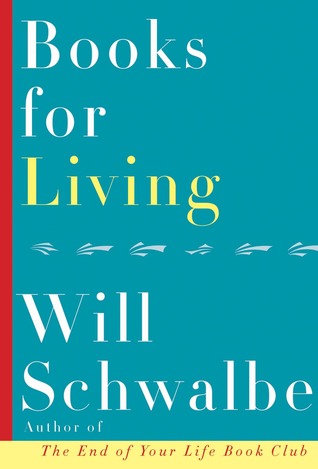
Books for Living by Will Schwalbe
For Will Schwalbe reading can be to escape, to learn, to explore a new culture or idea, for comfort or for any and all reasons. In this book Schwalbe discusses some books that made an impact on him whether for a profound reason or just because they remind him of a good time in his life. Reading can connect you with people - both real and fictional. As Schwalbe says, "...there's one question I think we should ask of one another a lot more often, and that's 'What are you reading?'" (p. 15). Reading can open doors we might not have explored or found otherwise. I had read some of the books Schwalbe discusses, but there were quite a few he inspired me to add to my ever-growing "to read" list. For anyone who is a reader this is a book for you - it's a quick, but profound read. While I did like Schwalbe's previous book The End of Your Life Book Club, I like this one even more.
It's too long to quote here, but I LOVED the chapter on 1984and his comparisons to our current cell phone/social media addiction. My synopsis - put down your phone/tablet/laptop and pick up a book to read.
It's too long to quote here, but I LOVED the chapter on 1984and his comparisons to our current cell phone/social media addiction. My synopsis - put down your phone/tablet/laptop and pick up a book to read.

When in French by Lauren Collins
Ugh. I had heard really good things about this book, but I couldn't even get through the second chapter. I really wanted to like it because the author is from Wilmington, NC, which is where my family is from, but it was terrible writing. She jumped from topic to topic within the same page. It was very hard to follow and just all over the place. Don't waste your time on this one.
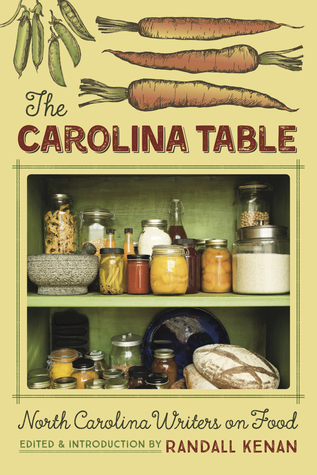
The Carolina Table: North Carolina writers on food by Randall Kenan, ed.
As Randall Kenan says in the introduction to The Carolina Table, "This is the story of the Tar Heel state through food." (p.7) A collection of essays centering around Southern food, food memories, and how food continues to shape the cultural experience of the South today. As with any collection of essays by different authors, there are some I liked more than others and some I could more personally relate to, but overall it is a great collection of stories about Southern food. It's a pretty quick read and I liked that the editor divided the stories into sections - Someone's in the Kitchen, Carolina Flavor, Adventures in Eating, and Traditions. Definitely a must-read for any NC foodies.
A quote I really liked:
"One time when we all went out for bagels in Chapel Hill, she [Lee Smith's mother] said, 'This may taste good to someone who has never eaten a biscuit.' Another thing she used to say is, 'No matter what is wrong with you, a sausage biscuit will make you feel a whole lot better.' I agree..." (p.47)
A quote I really liked:
"One time when we all went out for bagels in Chapel Hill, she [Lee Smith's mother] said, 'This may taste good to someone who has never eaten a biscuit.' Another thing she used to say is, 'No matter what is wrong with you, a sausage biscuit will make you feel a whole lot better.' I agree..." (p.47)
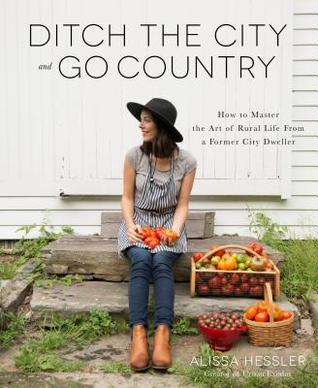
Ditch the City and Go Country by Alissa Morris
When Alissa Hessler and her husband moved from Seattle to rural Maine it was a hard adjustment for her. Because it took her years to learn better ways to transition from the city life to country life, she decided to start a website, Urban Exodus, for ex-city dwellers who were also moving into the country life to share her tips and connect with other former-city-now-country dwellers. While this book isn't super long, Hessler is really thorough in covering all the aspects of moving from the city life to the country life. She goes over things like how to make a living, what to look for in a new property/farm, how to grow a successful garden, raise livestock, enjoy the seasons, etc. Illustrated with beautiful photographs and she also includes recipes and lots of other helpful tips. Overall, a unique and helpful book if you're looking to escape the hustle and bustle of city life for the simpler country life.

Rise: how a house built a family by Cara Brookins
After having 4 kids and 3 failed marriages, with the last 2 marriages being abusive, Cara Brookins family has been through the ringer. On a Thanksgiving getaway to a cabin with her kids Cara is inspired to build a new house for them on the cheap - meaning they literally build it themselves. Once back home she finds the perfect lot and secures a bank loan for the house, but they only have 9 months to complete it. Rise alternates between Cara and her kids building their dream house and stories of the terror they lived in during and after her marriage to Adam (husband #2 who turned out to be violently schizophrenic). Building the house gave Cara and her kids the confidence they needed to move on after her violent marriages. While their story is inspiring, I didn't love the writing. There were some really weird parts with a spirit/guru/something that she would "see" when she would meditate when trying to go to sleep - that just felt really random and weird. Also, it's hard to understand how she could subject her kids to not one but two abusive and violent marriages. Overall, it wasn't as good as I hoped it would be.
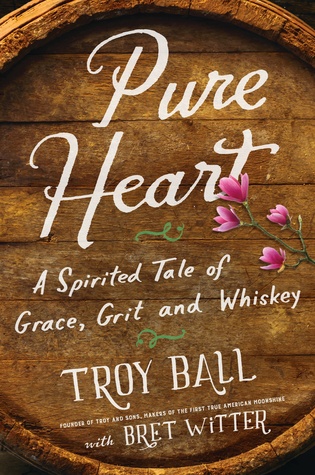
Pure Heart: a spirited tale of grace, grit, and whiskey by Troy Ball
Troy Ball grew up in Texas and was a Texas girl through and through. When she met her husband and they started their family everything seemed to be falling into place. But, both of their sons has severe special needs and it was a long time before doctors could even figure out what was wrong. Troy devoted herself to her son's care, but still managed to start several businesses along the way. Troy was an entrepreneur at heart and learned how to be a great salesperson from her father. Austin, TX is one of the worst places to live if you have allergies and her sons both had breathing issues, so the family decided to move to Asheville, NC. In Asheville is where Troy met a few mountain men who had family histories brewing local moonshine. She realized there was a gap in the market - no local, legal moonshine and that's how Troy & Sons Platinum whiskey was born. There were a lot of struggles, both personally and professionally, along the way, but Troy persevered. She became the "first woman licensed in the state of North Carolina to distill hard liquor, and only the fourth woman licensed in the entire United States." (p. 176) This is a story about family, both biological and the one you create, hard work, and how when those two things come together amazing things can happen.
I wasn't familiar with Troy & Sons before this, but her story is so amazing and unique that I will have to check it out now. Even if you're not a big drinker this is an uplifting and unique story that you won't want to miss.
I wasn't familiar with Troy & Sons before this, but her story is so amazing and unique that I will have to check it out now. Even if you're not a big drinker this is an uplifting and unique story that you won't want to miss.

The Stranger in the Woods: the extraordinary story of the last true hermit by Michael Finkel
This is one of those books that proves the axiom "truth is stranger than fiction." If this were a fictional story it would be completely unbelievable. For 27 years cabins around North Pond in Albion, Maine were routinely burglarized. Locals called the burglar the North Pond Hermit and he mostly stole food, batteries, books, and other small-scale supplies. No one thought it was the same person burglarizing for 27 years, but when Christopher Knight is caught in 2013 he confesses to upwards of 40 break-ins per year for the past 27 years. At 20 years old Knight just walked into the wilderness of Maine for no clear reason other than he wanted to be alone in the quiet of the woods. He survived by stealing everything he needed from food to clothes to shelter from seasonal cabins and a nearby camp. He only encountered humans on two occasions and never called his family or left the woods except for the break-ins. After he is arrested Michael Finkel manages to create a rapport with him and begins writing and visiting him which eventually leads to this book. Knight doesn't really even want to tell his story, if he could have his way he would go back into the woods again. He knew the stealing was wrong and never tries to justify it, but he truly enjoyed living a life of solitude in the Maine woods. Finkel does an excellent job of telling Knight's story from Knight's own perspective, as well as the perspectives of locals who were regularly burglarized. Finkel intersperses facts about solitude and hermits throughout Knight's story. Overall, a fascinating book that I just blew through in the course of a day at the beach.
Some quotes I really liked:
"According to more than a dozen studies conducted around the world, Knight's camp - an oasis of natural quiet - may have been the ideal setting to encourage maximum brain function. These studies, examining the difference between living in a calm place and existing amid commotion, all arrived at the same conclusion: noise and distraction are toxic...The body responds immediately, even during sleep. People who live in cities experience chronically elevated levels of stress hormone. These hormones, especially cortisol, increase one's blood pressure, contributing to heart disease and cellular damage. Noise harms your body and boils your brain." (p. 113)
"I began asking cabin owners - and, later, many others - to estimate the longest time they'd ever spend without human interaction. By this I meant not seeing anyone or communicating in any way, including phone, e-mail, or text messages. Just time by one's self, unconnected, though reading or listening to the radio or watching TV alone was okay. Nine out of ten people, often after a contemplative pause, realized that they had never passed a single day in solitude. Usually it was no more than a handful of waking hours. My father has lived seventy-three years but hasn't tried a dozen hours alone. I once embarked on a three-day solo wilderness trip but encountered a pair of hikers and stopped to chat, so my record is around forty-eight hours. A few accomplished explorers I know have gone a week. To meet someone who's finished a month would be extraordinary. Chris Knight, with his thousands upon thousands of days alone, was an unfathomable outlier." (p. 131-2)
"A large majority of men, and twenty-five percent of women, a University of Virginia study found, would rather subject themselves to mild electric shocks than do nothing but sit quietly with their thoughts for fifteen minutes. Unless you are a trained meditator, the study's authors concluded, the 'mind does not like to be alone with itself.'" (p. 136)
"He left because the world is not made to accommodate people like him. He was never happy in his youth - not in high school, not with a job, not being around other people. It made him feel constantly nervous. There was no place for him, and instead of suffering further, he escaped. It wasn't so much a protest as a quest; he was like a refugee from the human race. The forest offered him shelter." (p. 182)
Some quotes I really liked:
"According to more than a dozen studies conducted around the world, Knight's camp - an oasis of natural quiet - may have been the ideal setting to encourage maximum brain function. These studies, examining the difference between living in a calm place and existing amid commotion, all arrived at the same conclusion: noise and distraction are toxic...The body responds immediately, even during sleep. People who live in cities experience chronically elevated levels of stress hormone. These hormones, especially cortisol, increase one's blood pressure, contributing to heart disease and cellular damage. Noise harms your body and boils your brain." (p. 113)
"I began asking cabin owners - and, later, many others - to estimate the longest time they'd ever spend without human interaction. By this I meant not seeing anyone or communicating in any way, including phone, e-mail, or text messages. Just time by one's self, unconnected, though reading or listening to the radio or watching TV alone was okay. Nine out of ten people, often after a contemplative pause, realized that they had never passed a single day in solitude. Usually it was no more than a handful of waking hours. My father has lived seventy-three years but hasn't tried a dozen hours alone. I once embarked on a three-day solo wilderness trip but encountered a pair of hikers and stopped to chat, so my record is around forty-eight hours. A few accomplished explorers I know have gone a week. To meet someone who's finished a month would be extraordinary. Chris Knight, with his thousands upon thousands of days alone, was an unfathomable outlier." (p. 131-2)
"A large majority of men, and twenty-five percent of women, a University of Virginia study found, would rather subject themselves to mild electric shocks than do nothing but sit quietly with their thoughts for fifteen minutes. Unless you are a trained meditator, the study's authors concluded, the 'mind does not like to be alone with itself.'" (p. 136)
"He left because the world is not made to accommodate people like him. He was never happy in his youth - not in high school, not with a job, not being around other people. It made him feel constantly nervous. There was no place for him, and instead of suffering further, he escaped. It wasn't so much a protest as a quest; he was like a refugee from the human race. The forest offered him shelter." (p. 182)